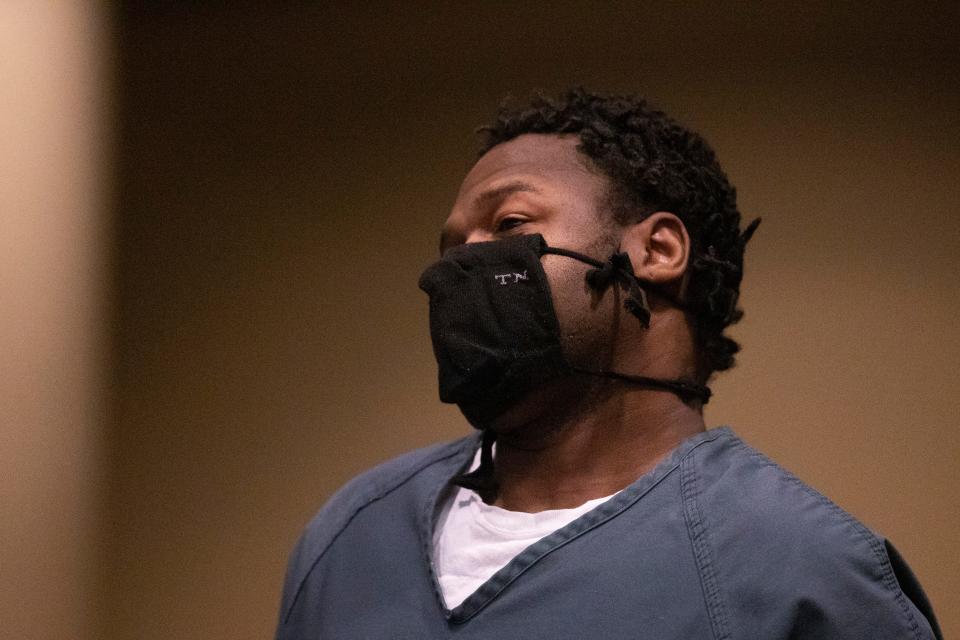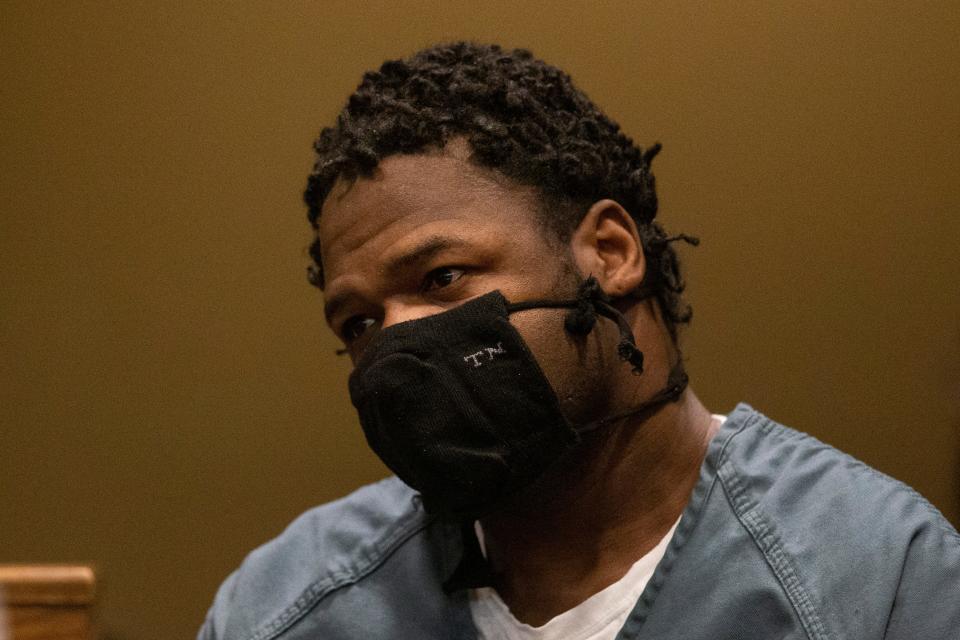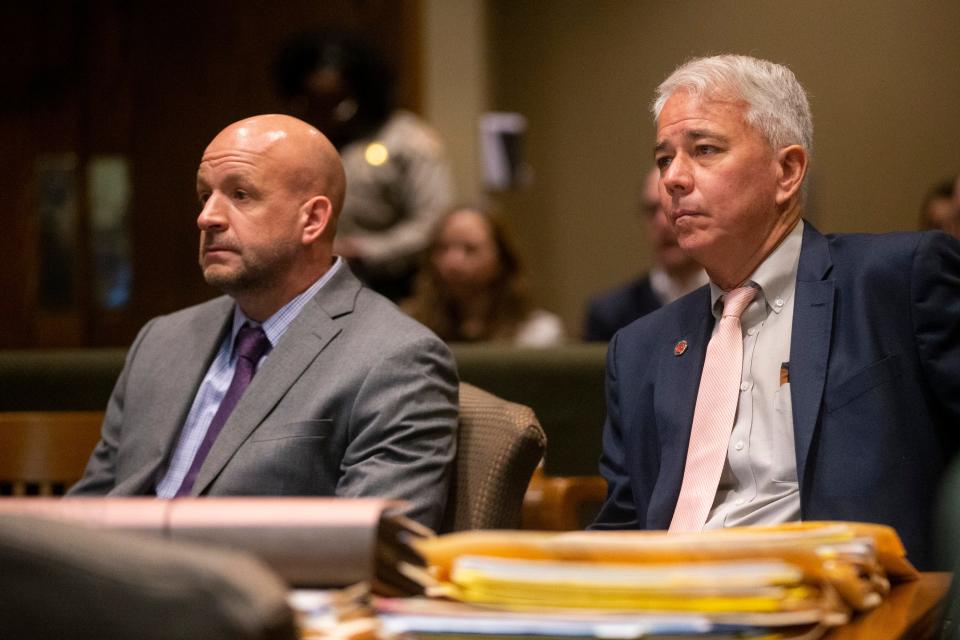Judge will not re-open Cleotha Abston-Henderson rape civil case against Memphis police
Alicia Franklin, a woman who said she was raped by Cleotha Abston-Henderson a year before he was charged with Eliza Fletcher's murder and kidnapping, will not have her civil case against the City of Memphis re-opened, according to a court order filed by Shelby County Circuit Court Judge Mary Wagner on Friday.
Franklin's case — which alleges the Memphis Police Department did not investigate her rape despite providing the name, contact information and social media account of the man who did it — was dismissed in March this year.
In a hearing to have the case re-opened in late June, Franklin's attorney, Larry Smith, introduced new testimony from Gwendolyn Brown, Abston-Henderson's girlfriend at the time of Franklin's rape.
Smith said Brown told a detective about Abston-Henderson, identifying him and confirming that Memphis Police Department already had his phone number. The detective, according to Brown, told her that her boyfriend was a "key suspect."
Along with Brown's testimony, Smith submitted warrants for Abston-Henderson's arrest as evidence. These warrants, Smith said, were active before Franklin's rape.
More: Cleotha Henderson was on MPD's radar leading up to Eliza Fletcher's abduction, death
According to Smith, this was indicative of MPD protecting Abston-Henderson, although he could not say why the department would do that. He said the reasoning could be learned through discovery if the civil suit was re-opened.
"It appears that the police department, for whatever reason, was protecting [Abston-]Henderson, rather than trying to arrest him and get him off the streets," Smith told reporters after the March hearing. "Our argument that there will be another day to find out why they were apparently protecting him is answered by the discovery process. Was he an informant?... Was he a friend of someone in the police department?... We don't know."
The City of Memphis filed its motion to dismiss the case in December 2022, citing four arguments. One of those arguments said the city "did not owe a duty to Ms. Franklin to investigate her rape," according to court documents.

The court disagreed with this argument, as well as the city's argument that Franklin could not establish causation for her physical and emotional suffering and an argument that police work is discretionary.
The argument that the court agreed with, however, came from the city citing Tennessee's Public Duty Doctrine of the Governmental Tort Liability Action, which was recently enhanced by the Tennessee Supreme Court by the Lawson v. Hawkins County ruling. The doctrine offers protections for government employees being sued for their actions or inactions.
In Wagner's ruling to deny the re-opening of the case, she said Smith did not request more time or argue that the Tennessee Supreme Court ruling negatively affected the case during arguments. The ruling came before those arguments were heard, and Wagner said they could have been used.
"At no time did the plaintiff seek additional time to address the Lawson decision or to amend any of her pleadings based upon the Lawson decision," Wagner wrote in the ruling. "In fact, plaintiff relied upon the Lawson decision in her response to the motion to dismiss, demonstrating her awareness of the decision."
Wagner went on to say Lawson did not change the law, but was "merely a clarification of claims allowed by the plain language of the GTLA."
When considering the submission of Brown's affidavit, Wagner wrote that Smith did not explain why that was not submitted prior to the case being dismissed, saying that her interaction with MPD was known and would not have changed her ruling had it been submitted earlier.
"...Ms. Brown and her interaction with the police was known to the plaintiff at the time she filed the complaint, even if plaintiff did not know all of the details of the interaction," she wrote. "Moreover, plaintiff fails to show the impact of the affidavit on the court's decision. While it may impact a claim for negligence or even possibly recklessness, it would not establish a special duty under the public duty doctrine."
Wagner also did not agree with Smith's argument that a special relationship between Franklin and investigators was formed due to a rape kit being taken.

Why is Franklin suing the City of Memphis?
Franklin first filed a lawsuit against the City of Memphis in September, about two weeks after Fletcher's body was found.
Fletcher was reported missing on Sept. 2, 2022, which triggered a manhunt for the missing jogger that saw local, state and federal law enforcement join the search. Abston-Henderson was connected to the abduction site, near the University of Memphis campus, after police sent a pair of slides to the Tennessee Bureau of Investigation for DNA testing, which returned a match.
Days after his arrest, he was indicted for Franklin's 2021 abduction and rape.
In her suit, Franklin said she gave police Abston-Henderson's contact information, social media and name, but he was never arrested for her rape. A rape kit was taken and sent to the Tennessee Bureau of Investigation for testing but did not return until after Abston-Henderson was arrested in connection to the Fletcher case.

Franklin's rape kit was not sent with a rush designation, nor was it sent with Abston-Henderson's name as a suspect. It was placed in a queue of unknown suspect rape kits at TBI's crime lab in Jackson.
When her kit was tested, and the DNA put into CODIS — a national database that catalogs DNA from people in the criminal justice system — it returned a match with Abston-Henderson.
Shelby County District Attorney Steve Mulroy announced his office's intent to seek the death penalty for Abston-Henderson, who currently has multiple pending criminal cases, during a July 6 court appearance.
Lucas Finton is a criminal justice reporter with The Commercial Appeal. He can be reached at Lucas.Finton@commercialappeal.com and followed on Twitter @LucasFinton.
This article originally appeared on Memphis Commercial Appeal: Judge will not re-open Alicia Franklin rape lawsuit vs. Memphis police

